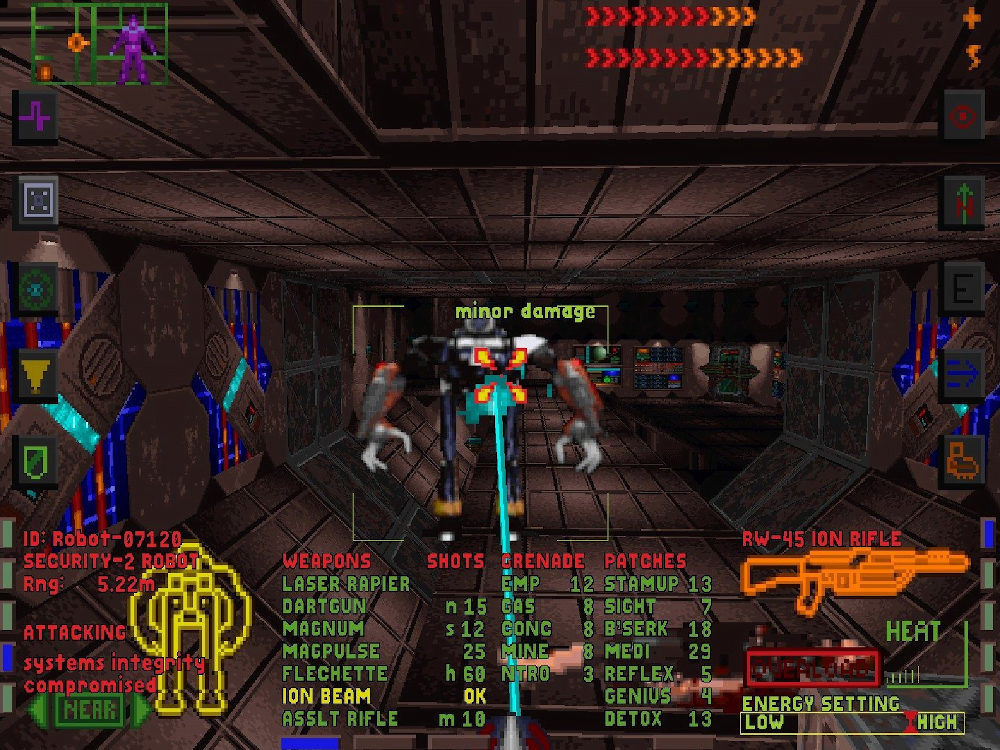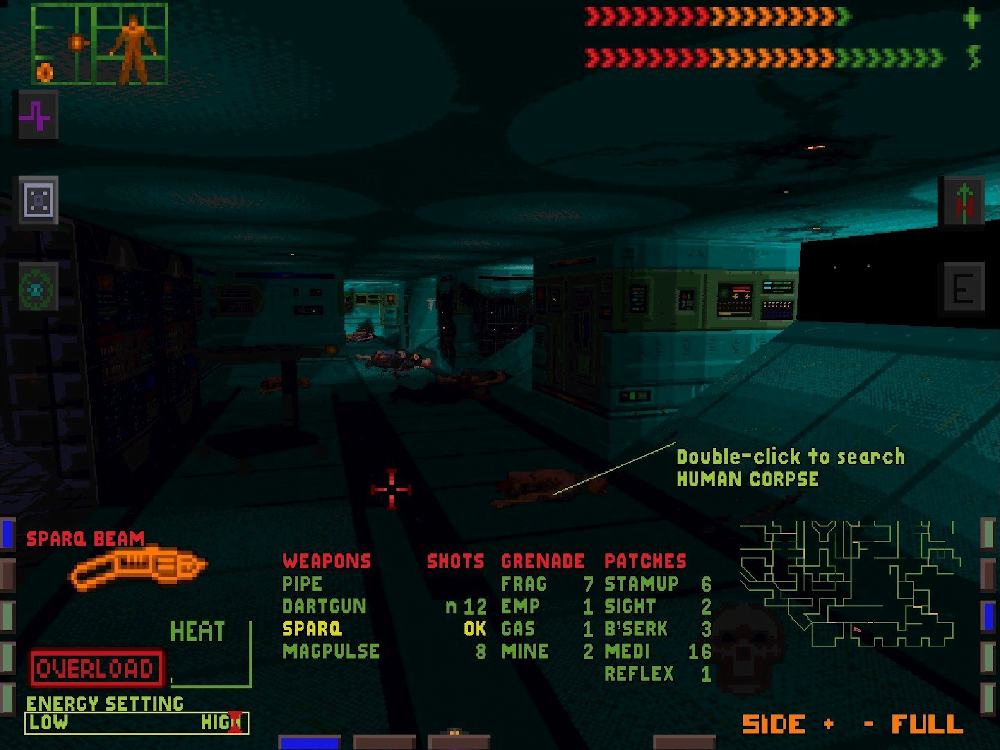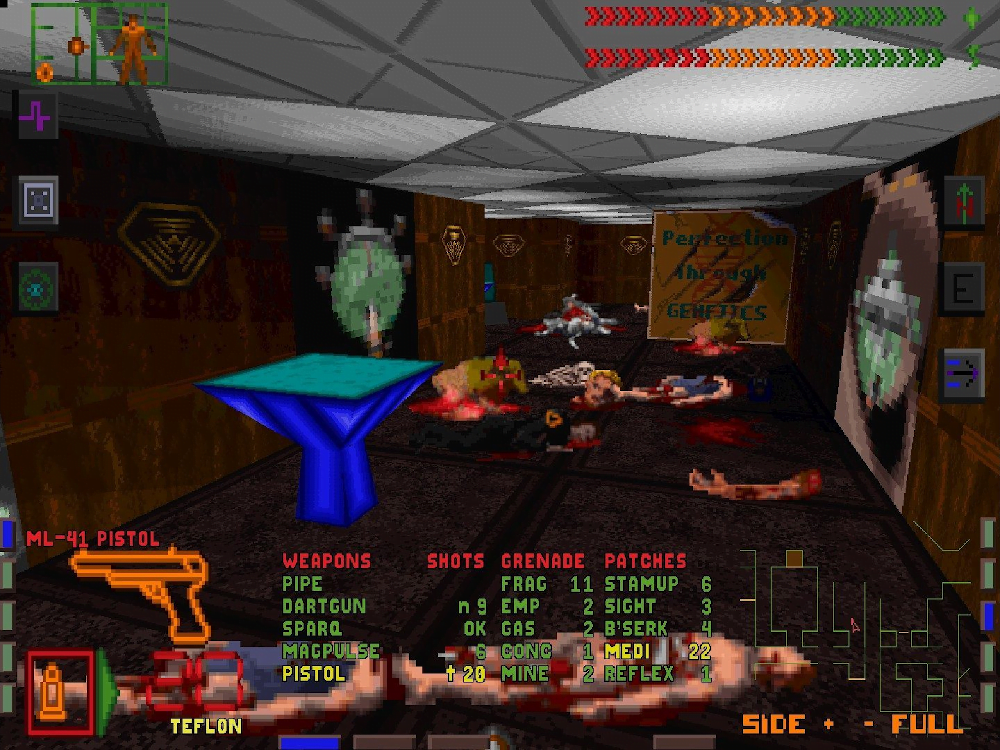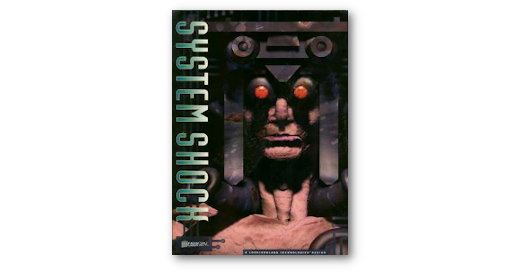System Shock is a 1994 first-person action adventure roleplaying shooter game with dialogue puzzles and a hacking minigame that pretty much stands as one of the many points we can say the Immersive Sim as a genre was born. In this game, you get one of the coldest opens you can get – you awake in a cryogenic chamber with your memory in tatters, in a strangely quiet space station, looking for weapons, medication, cybernetic upgrades and mind-altering drugs that you need to piece together what happened, what’s going on, and whether or not you’re going to get out of here alive.
Something that’s sometimes lost in the discussion of System Shock is how that for all it’s a cyberpunk game about laser guns and putting ports in your head, it’s also game that wants to expand on forebears like DOOM with its intense, moody music-and-level concotions and the corrupted sort of fantasy RPG system of the Ultima Underworlds.
It’s a cyberpunk adventure, but it’s also a horror game, and that horror comes in three distinct, intense phases.

The first phase is the horror of being alone.
It feels strange to me that this year’s Talen Month piles have been surely I’ve already talked about this products. Surely I’d covered this one already. Surely. I’ve mentioned System Shock plenty – particularly in conversation about Bioshock and Prey, games that took the same basic point and went in two wildly different directions that I found equally unsatisfying. I talked about how there’s a single moment in System Shock that scared the living hell out of me, but the game itself?
Nah.
It used to be that System Shock was this forgotten drop of early 90s first-person gaming that had the colossal bad timing to launch alongside Doom 2, and languished in obscurity for much of that time. Then in 2013, Good Old Games made much fanfare and hurrah about having the game ready for sale again, and there was a wave of rediscovery of this ‘classic’ title. It was even a Time Magazine article, which I saw as a strange sign of how secretly important System Shock was but really now I look back on that is more a testament to how content hungry website versions of print magazines wind up being.
When I say classic, though bear in mind System Shock, as a game, is classic in the same way bloodletting is classic medicine. Some old games, when you go back to them are brilliant and unpolished and enjoyable – especially old arcade games. Games aren’t just art assets and control schemes – they’re also part of a greater conversation about game literacy. Right now, WASD is just how you move around in games, but once upon a time the arrow keys were the given, and before then you would see games that ran on QA and OP, because they were trying to work like a conflict-light joystick (and DOS era joysticks were some nonsense). If you go back to a NES era game, the controls are going to maybe be sticky or ill thought out, but they’re not going to be cryptic. If you have a trackball and a jump button, the game is going to use the trackball and the jump button.
System Shock was designed for the PC controls back when there wasn’t even a confidently common language for what function keys did. Hey, here’s a weird trivia point for you: in original DOOM the save key (f5) was the same as the save key in all the Sierra text adventure games. No idea why that was a thing. F2 also tended to turn off noise in games but not always. The controls and interface of System Shock betray its origin as being from a time when there were lots of buttons to choose from to make a game do things, and a lot of things that game wanted to do, but surprisingly little ability to cleanly and conveniently convey that to a user.
Level design is pretty difficult to grapple with, too, because the game was constantly torn between lofty goals of creating spaces out of things that represented real locations with real purposes that real humans would operate in, and the desire to make interesting gameplay experiences for their sorta-shooter sorta-RPG sorta-puzzler sorta-mage game. One level of the game is in low light and full of invisible enemies that are hard to kill, because that’s great. There are a bunch of items that aren’t meaningfully valuable because they’re either worse than easily available things, or because they’re balanced with the expectation you won’t use them until the late game, and therefore, you learn how to get by without them. It also features that classic 90s gaming staple, a bloody maze, which is even more frustrating by deliberately messing with your mini map.
It’s just also in the raw interface, the information it presents you with. Look at these screenshots. You’re seeing screencaps here from the gog rerelease of an enhanced version of the game which adds a lot of modern conveniences, most notably mouselook and cleaned up fonts. Look at this garglemess and tell me you’re prepared to dive back into that hot basket. This is the improved interface.

The second phase is of realising you’re not alone.
There’s definitely scope to what System Shock wants to do, and you can spend days becoming good at it, even great at it, understanding every component system one by another. The speedrun of the game is something like twelve minutes long, with every single element of the game pre-emptively understood, all the keywords and passcodes and secret information that you need to advance through the game already determined, which is obviously an example of what a game looks like with every element but steps towards the end of the game at speed stripped away. It isn’t that the game is full of unnecessary systems, and if you’re not practiced to play the game in this perfect way, lots of different player options are all equally interesting.
An element of these big, sprawling, multi-system games like Dark Souls is that a large portion of the early game is spent tracking feedback loops as you discover what does or doesn’t work in the ways you want to use it. There might be tools in the early game that work beautifully well but because you’re unsure of how to use them, you spend time experimenting and losing resources, resulting in them being somewhat scarcer and untested for the rest of the game.
This means, like in Dark Souls, the game at its core isn’t very ‘difficult’ once you’ve mastered the systems, but because those systems are obtuse and obscured, the time spent building that mastery is always done unsure of how well or poorly you’re doing. You wind up taking reliable options that work predictably rather than experimenting, but the difficulty of the game is understanding and exploring the game. It’s not your power-house system driven FPS like Doom or Quake, nor is it a cutscene ridden logathon like the years-later Bioshock Infinite, it’s instead kind of like being handed a large quantity of homework and readings and told ‘deal with it.’
If you set the story difficulty to max, by the way, you have a hard time limit of six hours to do all your learning.
I should suggest that for the First Step over on GDQ Hotfix.
There’s a ton of lore in the game? Like, okay, it’s boilerplate cyberpunk malarkey. There’s in-fighting and there’s political intrigue and there’s a lot of pioneering work in the apocalyptic log genre, which I feel is possibly being explored for the first time in a videogame like this here? It’s not the first instance of apocalyptic logs as storytelling – after all, diary narratives are as old as novels – but there’s two reasons that this one actually works better than most.
See, when HP Lovecraft was doing apocalyptic logs, most of the time what he was doing was writing people who were writing in diaries. Writing in a diary is a manual task that requires a degree of focus and the task of committing ideas to paper tends to take slow and methodical process. In Bioshock, you had characters making steam-powered heavy audio logs recording apparently incidental moments in their day to day life, or somehow recording aural histories of important events. Recent events have shown that a surprising number of conservative shitheads are just waiting for the opportunity to do that anyway, but the number of accounts of things that are focused on real and true things and not on the frustrated way that someone is personally slighted by the nature of how Karen stayed on her porch a bit long, Karen. Still, the effort involved in recording these logs always seems a bit weird, especially when they record things like
y’know
Crimes.
In System Shock these logs are largely being developed by three types of personnel – researchers who are used to recording All The Data, military types who are trying to corral the nerds, and administrators who are trying to handle the different groups between one another, and they’re doing it on devices so good at recording information it’s literally no action to start recording your thoughts, directly from your damn skull. The cyberpunk tenor holds together a game element that looks ridiculous the more effort required to construct these narratives… but they’re still not great.
There’s not really any lines in the narrative logs of System Shock that stands out to me. I’m not complaining, they’re fine, but there’s no moment I stop and go oh wait, damn, what about this bit of dialogue (though in the sequel) while reading the logs and emails of personnel across the station.
The main character’s a forgettable blip. So much so that I thought for years that you played a gender-identity free shapeless blob of nothing, only to learn this week that there’s an opening cinematic where you’re shown your main character – a generic 3d model of a dudelike. Let’s just declare that cinematic non-canon and move on with our lives, because this is a game that does so little to inform the protagonist’s character and lets you make so many choices about how they work, you’re really just better off letting people have that freedom rather than pretend that System Shocksman is in any kind of way a character that we’re all meant to have shared opinions of. In fact, when it comes to character, almost every part of System Shock is kinda… generic and unengaging.
System Shock is a huge spread of parts and pieces, some of which are decent, some of which are good, and none of which stand out to my mind as being great.
Except.
Except.
There’s that thing that holds all this narrative together
All of it.

The third phase is realising you’re alone with her
It’s said that you can know a person by the quality of their enemies and that’s a statement that reflects well on you and extremely poorly on SHODAN by comparison. SHODAN is the consummate over-achieving villainess of the videogame period of the time. She’s powerful and she’s threatening and she’s scary and she’s excellently voice-acted by the impossibly perfect Terri Brosius (who was voice and level design for Dishonored and Dishonored 2, just to remind you that those games are perfect).
SHODAN is a character who originally mostly just scared me, and then afterwards as I grew older and stopped playing the game quite so much I came to appreciate her more as a villain who was unabashedly, coherently, sensibly evil. In System Shock you learn that SHODAN has a massive mining laser trained on earth, intent on destroying it, because she thinks she can put the raw materials of it and everything on it to better use. That’s how you start out. When you stop that plot, though, despite her attempts to stop and kill you, she has a backup plot. Then when you stop that, she has another backup plot, and this backup plot can only be thwarted if you park your dumb ass in a death trap and when you do that, you can only get out of it thanks to being smart enough to prepare a solution ahead of time that she literally is hard wired to not anticipate. And then she has two more backup plans after that. This isn’t some structurally failure-prone villain! SHODAN has an immense capacity and the ability to plan and she does and despite her overwhelming characteristics being that she’s incredibly arrogant, she’s still smart enough to actually treat you like a threat, constructing a variety of traps and exploiting opportunities that deal with you when you arrived into her situation out of context.
The main character of System Shock is a hacker from earth, who got caught, and was put on the Citadel, the site of the game, in space, to recover for a secret backup project, ‘just in case.’ SHODAN didn’t kill you in your cryogenic sleep at the time, nor were you anywhere she could conveniently deal with you, because she was made to not know about you. And it was in this design that SHODAN falls.
Isn’t that amazing? SHODAN loses, not because of her pride, indeed, her pride by all standards is extremely legitimate. She loses because of an out-of-context problem, a solution to a problem she couldn’t have anticipated, and even when she did face that kind of problem, she planned for multiple layers of redundancy!
Women in videogames have been fraught and it’s not like SHODAN is perfect, but she’s better than you expect. Sure, she’s a meglaomaniacal monster cybernetic woman who spends the entire game belittling you but she’s broadly right and her positions of disdain and heartless hatred for humanity are not literally there ‘for no reason’ – she has no reason to see humans as inherently worthy of living, and from there, the question becomes well what can I use those parts for? Her opinions and her expression make sense, and as the game goes on, as you learn about her love of violence and her desire to be obeyed, she becomes quite personalised. It’s not like she has a childhood backstory to lean on when she talks to you. Instead, you get bullying and threats and insults and pretty much never do you get anything that could be considered an ‘advantage’ over her. It’s not like she lets slip passcodes or nothing.
One of my favourite details in this game is that after one of the harder boss fights, there’s a point where she immediately opens all the monster closets to try and get you killed.
What a queen.
This is why you go back and you play System Shock in this year, in 2020. You go back to this 26 year old game not to play with the systems but just to spend time around this condescending and aggressive and sneering awful monster of a woman who spits her address to you, who can talk smoothly, and clearly, and evenly but doesn’t because you don’t deserve it, a perfect, nebulous, drifting AI that exists in transcendental permanence beyond your existence as a thing of meat.
You play System Shock to hope that SHODAN notices you.
